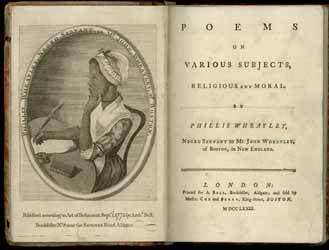Collections Online
Poems on Various Subjects, Religious and Moral
To order an image, navigate to the full
display and click "request this image"
on the blue toolbar.
-
Choose an alternate description of this item written for these projects:
- MHS Collecting History
- MHS 225th Anniversary
- Main description
[ This description is from the project: Witness to America's Past ]
Phillis Wheatley, the author of this first book of poetry by a Black American, was born in West Africa. Between the ages of seven and eight, she was kidnapped and brought to America on the slave ship Phillis. After her arrival on 11 July 1761, the frail child was put up for auction by Boston slave dealer John Avery and purchased by Susanna Wheatley, wife of prominent Boston merchant John Wheatley.1
The Wheatleys provided Phillis a life and education far superior to that of the average Boston woman. She was tutored by the Wheatleys' daughter, Mary, and is said to have mastered English in sixteen months. Her status as a slave is somewhat misleading, as she was treated almost as a member of the family, serving as Mrs. Wheatley's companion, doing very little menial labor, and often eating with the family. Her position in the household also allowed her to meet with many prominent Boston citizens of the day and her literary pursuits were encouraged when she began to write poetry, about the age of twelve.2
Her first poem to be published was "On Messrs Hussey and Coffin" in the Newport (Rhode Island) Mercury for December 1767.3 In 1772, after having several poems individually published, Phillis attempted to publish a volume of her collected works. Her proposal to raise subscriptions listed twenty-eight titles and was printed in the Boston Censor in early 1772. However the advertisement did not generate enough response, and she then attempted a British publication.4 Susanna Wheatley became involved in the proposed publication by writing to the Countess of Huntingdon and promoting her slave's work.5
In 1773 Phillis was advised to get some sea air because of her frail health, and she decided to accompany the Wheatley's son Nathaniel on a trip to London aboard the family-owned ship, the London Packet. Phillis was well-received in England but was unable to meet the Countess of Huntingdon, to whom the book was dedicated, who was in Wales at the time. Phillis felt obliged to return to Boston in July when she was informed of her mistress's ill health.6
Poems on Various Subjects, Religious and Moral contains thirty-nine poems, one-third more than were listed in her 1772 proposal. Due to growing political tensions, several poems were changed to better suit the British audience, and at least one poem, "A Farewell to America" was added after Phillis's arrival in London. The volume was published in London in September of 1773 through London subscriptions and the combined efforts of the Wheatleys and the Countess of Huntington. During that fall, Phillis was legally freed by her master.7
Upon her return to America, the advantages previously enjoyed by Phillis began to wane. Mary Wheatley had left the family home in 1771 to marry the Reverend John Lothrop, pastor of the Second Church in Boston, and Susanna Wheatley died in 1774, but Phillis was allowed to remain with the family until the death of her former master in 1778. In April of 1778, she married John Peters, a free black man, and they had three children, only one of whom survived. The marriage encountered disillusionment and financial difficulties, forcing Phillis to earn her living working in a boarding house. She lived the remainder of her life in poverty and misery, and her lifetime of poor health came to an end on 5 December 1784. She was buried with her last remaining child in an unmarked grave.8
Phillis's Poems on Various Subjects was her only published collection. She published two proposals for a second volume, in 1779 and 1784, however wartime shortages doomed the project to failure.9 The first American edition was published in Philadelphia in 1786. It has been re-printed numerous times and widely anthologized. The volume shown here is at least a second printing, as it contains the dedication to the Countess of Huntingdon, a preface by the poet, a brief biographical sketch of her by John Wheatley, and an attestation signed by eighteen prominent Bostonians certifying the credibility of Wheatley's poems; none of these were present in the first printing. The frontispiece of both editions contains an engraving of Wheatley, done by Scipio Moorhead, the slave of Rev. John Moorhead, pastor of the First Church of Presbyterian Strangers. At the insistence of the Countess of Huntingdon, Moorhead traveled to London to do the engraving specifically for the frontispiece. Wheatley's poetic tribute to him, "To S.M. [Scipio Moorhead]. A Young African Painter, On Seeing His Works," is published in her collective volume."10 This edition was probably the "blue paperback sewn edition" rebound into an early-nineteenth-century hardcover binding.11
The Massachusetts Historical Society holds several of Wheatley's manuscript poems, some variations of those published in her 1773 collection, first published in the Society's Proceedings, as well as her letters to her friend Obour Tanner.12
1. Phillis Wheatley. Poems of Phillis Wheatley. Julian D. Mason, Jr., ed. Rev. and enl. Ed. Chapel Hill, 1989, pp.2-3.
2. Ibid., pp.4-5.
3. Robinson 1975, p.14.
4. Phillis Wheatley. Poems of Phillis Wheatley. Julian D. Mason, Jr., ed. Rev. and enl. Ed. Chapel Hill, 1989, pp.186n-188n.
5. Robinson 1975, p.14; Phillis Wheatley. Poems of Phillis Wheatley. Julian D. Mason, Jr., ed. Rev. and enl. Ed. Chapel Hill, 1989, pp.186n–188n, 193n–194n.
6. Ibid., pp.6,8.
7. Ibid., p.8.
8. Ibid., p.10.
9. Ibid.
10. Sidney Kaplan. The Black Presence in the Era of the American Revolution, 1770-1800. Washington, 1973, pp.157–158.
11. William H. Robinson. Phillis Wheatley: A Bio-Bibliography. Boston, 1981, pp.14-15.
12. Proceedings of the Massachusetts Historical Society 7 (1863–1864). pp.165–167, 267–279.

